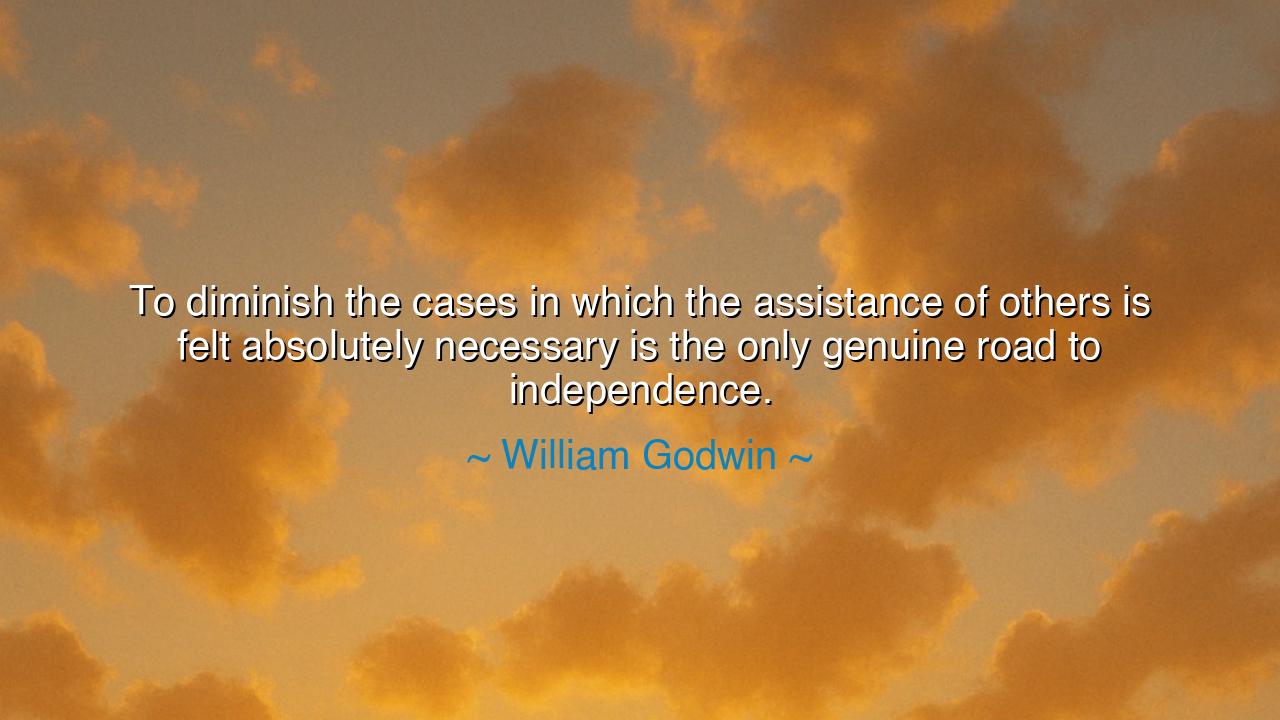
To diminish the cases in which the assistance of others is felt
To diminish the cases in which the assistance of others is felt absolutely necessary is the only genuine road to independence.






The words of William Godwin, when he wrote, “To diminish the cases in which the assistance of others is felt absolutely necessary is the only genuine road to independence,” flow with the serene wisdom of one who has contemplated both freedom and dependence in the deep silence of the mind. In this simple yet profound sentence, Godwin, the great philosopher of the Enlightenment and father of Mary Shelley, gives voice to an eternal truth: that independence is not a gift bestowed by circumstance, but a discipline of the soul — a deliberate lessening of need, a mastery over the self. His words are not a call to isolation, but to self-sufficiency, that noble state in which a man or woman, having tamed their appetites and conquered their fears, becomes the author of their own life.
To understand his meaning, one must first understand the man. William Godwin lived in the late eighteenth century, when the great tides of revolution — American, French, and intellectual — were reshaping the world. He was a philosopher of reason and individual liberty, believing that true progress came not through domination or dependence, but through the cultivation of the mind and conscience. His writings on political justice and human improvement inspired poets and radicals alike. Yet, behind his philosophy burned a moral flame: the conviction that freedom begins within. Thus, when he speaks of “diminishing the cases in which assistance is felt absolutely necessary,” he is teaching that one becomes free not by rejecting others, but by learning to stand firm, unshaken, when others cannot be there.
The road to independence, as Godwin describes it, is not paved with rebellion, but with restraint. It is not the loud declaration of one’s autonomy, but the quiet strength of one who needs little to be whole. To diminish dependence is to learn the art of contentment — to be rich in simplicity and steadfast in purpose. The wise man, says Godwin, does not scorn companionship or community, but he refuses to let his happiness be hostage to them. He cultivates the inner resources of mind and heart, so that when the world turns against him, he remains unbroken. In this lies the truest kind of power: the mastery of self in a universe that forever tempts the soul to lean upon others for comfort, identity, and direction.
Consider, as an illustration, the life of Diogenes of Sinope, the ancient philosopher who lived centuries before Godwin but embodied his teaching. Diogenes possessed almost nothing — a cloak, a staff, a lamp — yet his mind was freer than that of any king. When Alexander the Great, conqueror of nations, stood before him and asked what he could do for him, Diogenes merely replied, “Stand out of my sunlight.” This was not arrogance, but a declaration of spiritual independence. Diogenes had so diminished his needs, so trained his heart in sufficiency, that even the ruler of the world could offer him nothing. He had mastered the lesson Godwin would later articulate — that every dependence surrendered, every unnecessary desire subdued, brings the soul nearer to freedom.
Yet Godwin’s wisdom is not meant only for philosophers and saints. It is a teaching for all who would live with dignity. In our own time, the world entices us to dependency — on wealth, on approval, on endless consumption of comfort. We are told that happiness lies in what others provide: recognition, validation, security. But Godwin’s voice cuts through the noise of centuries: the more we rely upon the favor of others, the weaker we become. To walk the genuine road to independence is to learn to provide for oneself — not only in bread and coin, but in spirit. It is to cultivate inner peace that does not require applause, strength that does not beg for rescue, wisdom that does not depend on borrowed thought.
However, this teaching must not be misunderstood. Independence is not the denial of love or the rejection of society. Even Godwin, that stern philosopher of self-reliance, believed in compassion and cooperation. The independence he praises is not the solitude of pride, but the freedom of integrity — the capacity to give rather than to cling, to serve from abundance rather than need. When we no longer depend on others for our worth, we can truly honor them; when we no longer crave their aid, we can offer them ours. Thus, self-reliance and generosity are not enemies, but twins: one nourishes the other.
So, O listener, take this teaching deeply into your life. Seek to diminish the cases in which you must be rescued, guided, or consoled by others. Strengthen your mind with learning, your body with discipline, your heart with reflection. Do not fear solitude, for in solitude the roots of independence grow. Learn to ask not, “Who will help me?” but, “What can I do myself?” Yet remember also to extend your hand when others fall — for only those who have stood alone can truly know how to lift another.
Thus, the wisdom of William Godwin endures: that the road to independence is the road inward — a narrowing of need, a widening of strength. Each dependency overcome is a link broken from the chains that bind the spirit. Walk this road not in haste, but in reverence, for its destination is not isolation, but peace. When you reach the place where you no longer must depend, but choose to share, you shall have found the highest freedom — the freedom of one who stands firm, alone if need be, yet connected to all by strength, not by need.






AAdministratorAdministrator
Welcome, honored guests. Please leave a comment, we will respond soon